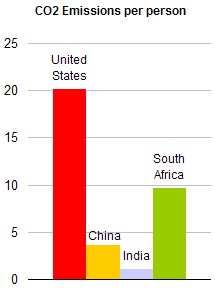Humans need a lot of energy. We consume energy for light, heat, transport, food… Basically everything we do requires energy. The problem is that using energy in it’s popular forms is doing some serious damage to our environment.
Currently most of the energy we use comes from fossil fuels (oil, natural gas and coal) which we burn to create energy. Unfortunately burning those fossil fuels also pollutes the air and drives global warming. Global warming = bad.
So we need to change our habits (waste less energy) and we could change our energy sources (to those less damaging). There are renewable sources like solar and wind power which basically make use of the copious amounts of energy the sun beams down to earth every day. However, these sources are expensive, inconsistent, and chew up large amounts of space.
Nothing is ideal, but you should be rational and not emotional in your decisions.
There is another great option, also not ideal, but the best (in my opinion) currently available. Nuclear power has an unfairly bad reputation. When used properly it is an excellent energy source – and it produces no air pollution! As the Economist says:
- Nuclear power offers the possibility of large quantities of electricity that is cleaner than coal, more secure than gas and more reliable than wind. And if cars switch from oil to electricity, the demand for power generated from carbon-free sources will increase still further. The industry’s image is thus turning from black to green.
The Economist has articles here, here, here and here describing that:
- Nuclear power is very clean as the graph below shows.
- Nuclear power can be safely generated. Even taking into account Chernobyl (4,000 dead) and Three Mile Island (0 dead) nuclear power is extremely safe – and getting safer.
- Nuclear power can be generated cheaply. Initial costs are extremely high, but over time it makes economic sense. This would be especially true were the negative environmental costs of fossil fuels built into their already high cost.
- There are pretty good ways of storing the radioactive waste generated.
- Many previous nuclear protesters and “greens” are changing their minds and advocating nuclear power.



 Gareth Cliff is a “controversial” morning radio presenter in South Africa. He was recently discussing this crazy story about the
Gareth Cliff is a “controversial” morning radio presenter in South Africa. He was recently discussing this crazy story about the 
 Desmond Tutu is someone who I find I almost always agree with. The man does not buy into the loyalty-above-all-else culture of the ANC. He has the guts to take “them” on about a lot of things, but is still perceived as a constructive force. I wonder what his economic policies are – perhaps he could lead a successful opposition.
Desmond Tutu is someone who I find I almost always agree with. The man does not buy into the loyalty-above-all-else culture of the ANC. He has the guts to take “them” on about a lot of things, but is still perceived as a constructive force. I wonder what his economic policies are – perhaps he could lead a successful opposition.

